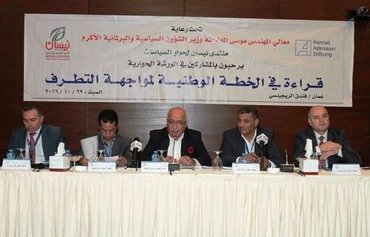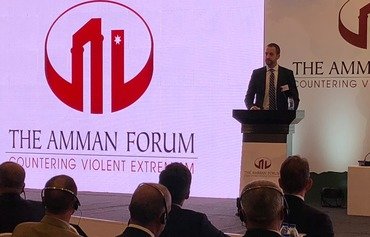Jordan continues to push forward in the fight against extremism through a higher education programme that aims to train students in counter-terrorism and counter-extremism strategies.
The programme, run by the Royal Jordanian National Defense College (RJNDC) in co-operation with Jordanian universities, accepts applicants from Arab and foreign countries.
The applicants can be either civilians with at least 10 years of experience in their specialty, or military personnel, according to the RJNDC's website.
Crown Prince Hussein bin Abdullah attended the June 7th graduation ceremony of the first class of the Strategies Programme for Countering Extremism and Terrorism.
The graduates have received advanced scientific and intellectual training in line with the requirements of the times, said RJNDC Commandant Brig. Gen. Nasser Mohammad al-Muhairat.
Their training matched the high-level strategy training that is offered by many international universities and academies, he said during the graduation ceremony.
"They have become leaders equipped with knowledge, armed with determination and ambition, and ready to perform their national duties at the highest level," he said.
Programme goals
The programme aims at graduating qualified researchers specialised in counter- extremism and terrorism, who can provide strategic solutions to contemporary developments in this field.
It also aims to provide public and private national institutions with experts who can help prepare national strategies to counter extremism and terrorism.
It also encourages co-operation, co-ordination and exchange of academic expertise among universities and research centres at the regional and international levels.
"Jordan is at the forefront of Arab countries fighting terrorism," said strategy analyst and retired military officer Maj. Gen. Adeeb al-Sarayreh.
The launch of a specialised strategies training programme on countering terrorism and extremism "is very important as Jordan can share its extensive experience in this field with brotherly [Arab] and friendly countries", he told Al-Mashareq.
Jordan is working to implement a national counter-terrorism strategy that considers "sound thinking, strong arguments, persuasion and ideological dialogue" as main factors of its success, he said.
Hence the need for trained academic specialists in this field, al-Sarayreh said.
"Jordan has suffered from terrorism and has been working to develop its counter-terrorism strategies and methods," he added.
Training officers from other countries also contributes to spreading the benefit and sharing the kingdom’s experience in this regard, he said.
'Network of counter-terror specialists'
Despite the "Islamic State of Iraq and Syria" (ISIS) group's defeat in Iraq, vigilance, alertness, readiness and strategic planning must be maintained, military expert Fayez al-Dweiri told Al-Mashareq.
"Such programmes prepare qualified cadres to plan and train future generations and contribute to the formulation of better counter-terrorism strategies and plans," he said.
"One of the most important benefits of these programmes is the exchange of expertise," he said, as the participation of officers and students from several Arab and foreign countries is one of the distinguishing features of the programme.
"Terror [groups] operate across borders and can strike anywhere," al-Dweiri said. "Therefore, there is a need for co-operation on strategies and the exchange of opinions and ideas."
The existence of such programmes helps build a network of specialists in counter-terrorism strategies, and this is important in the global war on terrorism, he added.

![Jordan's Crown Prince Hussein bin Abdullah attends the graduation ceremony of the first class of the Strategies Programme for Countering Extremism and Terrorism at the Royal Jordanian National Defense College on June 7th. [Photo courtesy of the Crown Prince's media office]](/cnmi_am/images/2018/07/04/13211-Jordan-Crown-Prince-600_384.jpg)





